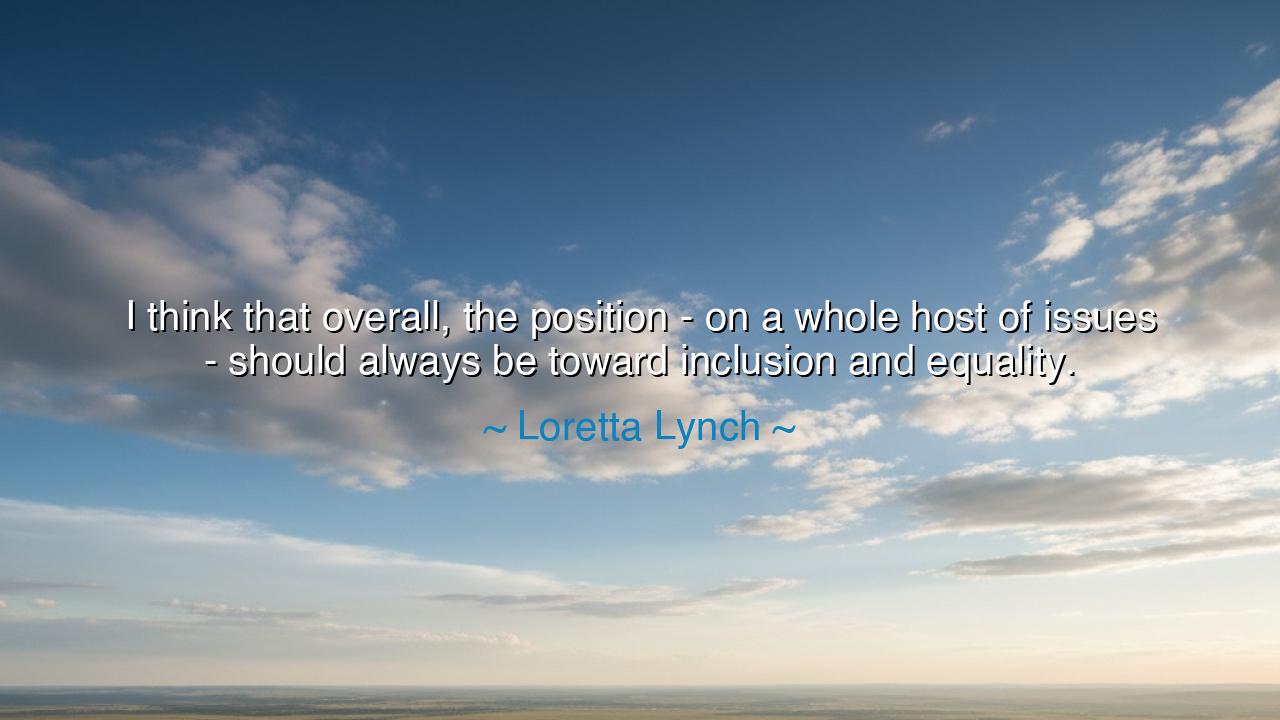
I think that overall, the position - on a whole host of issues -
I think that overall, the position - on a whole host of issues - should always be toward inclusion and equality.






“I think that overall, the position — on a whole host of issues — should always be toward inclusion and equality.” — Loretta Lynch
In these words, Loretta Lynch, former U.S. Attorney General, speaks with the timeless voice of justice — a voice that rises above politics and creed to remind humanity of its higher calling. Her declaration is not merely a statement of policy, but a moral compass — a guiding flame for nations and individuals alike. When she says that our position must always lean toward inclusion and equality, she echoes the ancient wisdom that a society’s greatness is not measured by its wealth or power, but by how it embraces those on its margins.
From the dawn of civilization, the struggle for equality has been one of humanity’s defining quests. The philosophers of Greece spoke of justice as harmony, where every person holds their rightful place; the prophets of old thundered that all souls are equal before the Divine. Yet even across the centuries, mankind has stumbled over pride, fear, and difference. Lynch’s call for inclusion is the modern echo of that ancient yearning — the demand that all who live within a society share equally in its promises and responsibilities, regardless of race, gender, faith, or station.
The story of civilization is filled with those who fought to widen the circle of belonging. When Nelson Mandela stood before the people of South Africa after twenty-seven years in prison, he did not speak of vengeance but of reconciliation. His message — that freedom means nothing if it is not shared — mirrors Lynch’s belief that inclusion is not a concession but a necessity. It is the soil from which peace and progress grow. Nations that exclude or divide their people may thrive for a season, but their roots rot beneath the surface. Those that embrace diversity, however, endure like mighty trees through storm and drought alike.
Lynch’s insight also carries a warning: that neutrality in the face of inequality is itself a choice — a turning away from justice. To say “always toward inclusion and equality” is to insist that every decision, whether in government, business, or personal life, must be weighed against this eternal question: Does it unite or divide? Does it uplift or oppress? Like a wise teacher of old, she reminds us that righteousness is not found in silence, but in the deliberate act of drawing others in.
Consider the example of the Civil Rights Movement in America. Those who marched across the Edmund Pettus Bridge or sat at segregated lunch counters did not ask for charity — they demanded inclusion as a birthright, and equality as a promise yet unfulfilled. Their courage reshaped a nation, proving that justice bends only under the weight of persistence. Lynch’s words are born from that same lineage — she, too, carries the torch passed down from those who dared to believe that inclusion is not weakness, but the truest form of strength.
Yet inclusion and equality are not static achievements; they are living principles that must be renewed with each generation. Every era faces its own temptations to build walls — of race, of religion, of ideology. Lynch calls upon us to dismantle those walls, not by erasing difference, but by honoring it. True inclusion is not sameness; it is the recognition that diversity strengthens the whole. Like the ancient mosaics where each colored stone forms part of a greater image, society finds its beauty only when every piece is allowed to shine.
So let this be the lesson preserved from her words: choose inclusion, choose equality, always. Not as slogans, but as ways of living. Welcome the stranger, listen to the unheard, defend the dignity of all — for every act of kindness toward another restores a fragment of the world’s broken harmony. The ancients taught that justice is the soul of a nation; without it, no empire endures. Loretta Lynch’s wisdom reminds us that justice begins in the heart — in the daily, deliberate choice to move always, and without hesitation, toward inclusion and equality.






AAdministratorAdministrator
Welcome, honored guests. Please leave a comment, we will respond soon